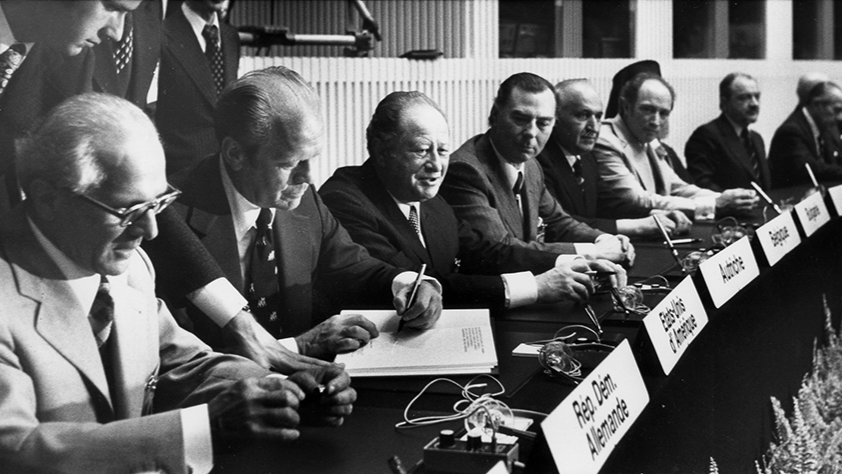One of the many lessons I have learned as a negotiator, is that one needs to understand the “environment”, in order to survive or even more so, thrive in it. In times of change, such as the current ones, it is important to maintain perspective.
In the summer of 1975, 35 countries from Europe (all European states, East and West, except Andorra and Albania), the USA and Canada, signed the Helsinki Accords. The document aimed at safeguarding and improving the status quo and peace between East and West. The first of four groupings (or “baskets”) of the Accords, was dedicated to a “Declaration on Principles Guiding Relations between Participating States”. It composed of a decalogue governing cooperation between the signatories. A simple reading of the Decalogue is telling:
- Sovereign equality, respect for the rights inherent in sovereignty
- Refraining from the threat or use of force
- Inviolability of frontiers
- Territorial integrity of states
- Peaceful settlement of disputes
- Non-intervention in internal affairs
- Respect for human rights, and fundamental freedoms, including the freedom of thought, conscience, religion or belief
- Equal rights and self-determination of peoples
- Co-operation among States
- Fulfillment in good faith of obligations under international law
The very first paragraph, “Sovereign Equality” stipulates that states had equal rights, independent of size, population, wealth, religion and system of government. In the 50 years since the Helsinki Accords, many of us fell victims of the fallacy that Democracy eventually prevailed (after the collapse of the Berlin Wall), the provisions of the Accords were a permanent conquest of humanity and that life would take a predictable, positive course.
Reality check: Most of the provisions for the Helsinki Accords, have either been violated (e.g. No. 3 - Ukraine) or are now in question (have your own pick from the decalogue, and I will provide you with three examples for each one). We are moving in a world where large countries can impose their will on smaller ones. Big, strong leaders, whose democratic values are not their forte, can make “deals” between them, in the absense of smaller nations involved.
Why does this matter? Because especially in Europe, people as well as governments still operate as if the Helsinki Accords are still in force. The irony is that the Helsinki Accords were never binding as they did not have Treaty status, but even the hard line Communists of Leonid Brezhniev made a real effort to respect them (even if they failed miserably in the end). It is imperative and urgent for governments to come to terms with this new reality and adopt. No one will fight their wars, no one will come to their financial rescue if need be, and most will not operate on the basis of principle.
Is this a grim outlook? Most certainly yes! Non the less, it is a new reality. Ignoring reality and living in a buble, never ends well. This is a new environment, with very little resemblance to what we all knew a couple of years ago. Economic volatility and political instability are now permanent features of our world. State behavior will be driven by short term interest and will ignore history, alliances which exist only on paper, and principles.
What should we expect and what can be done? Economic slow down is a certainty. Countries will start spending much more for weapons and much less for social services. This means that certain industries will blossom, but many more will find themselves struggling. Standards of living will not improve, at best. The only way to reverse this, is for supra-national organizations to evolve into tighter structures. For example the EU, possibly in sync with other like minded states that care about democracy, the rule of law, human rights, respect of justice etc, can adopt to this new environment and produce an alternative that departs, both from the totalitarian regimes of the East as well as the emerging authoritarian variation of US democracy. This is a collosal task requiring hard and painful, albeit necessary choices. Abolishing veto privileges to facilitate decision making, re allocating funds away from welfare in favor of defense, re aligning alliances, using trading policy as a diplomatic tool and reconfiguring fiscal and monetary policy at the supranational level, are only a few areas where steps must be made.
These are times calling for agility, compromise, adaptability, and new deals. Very interesting times for negotiators indeed!

